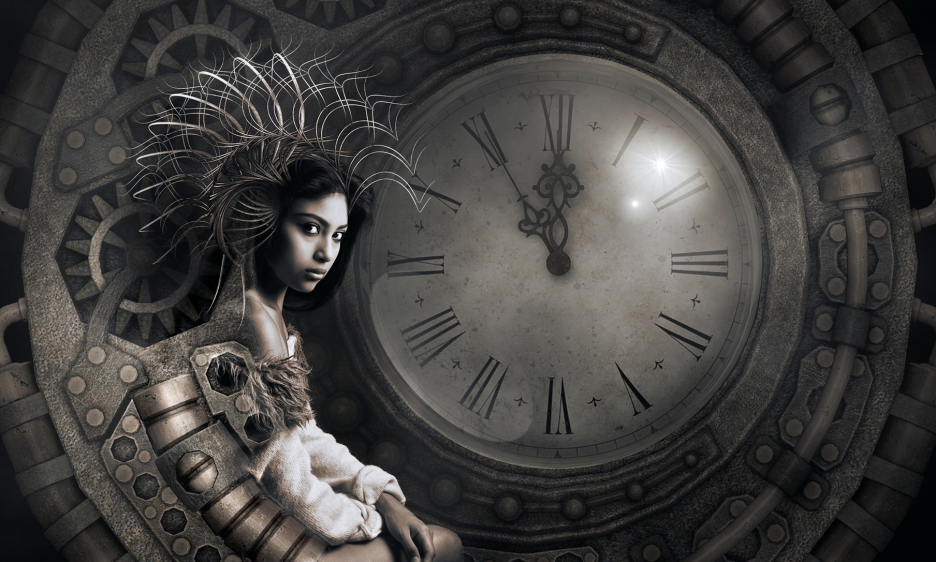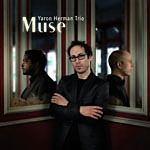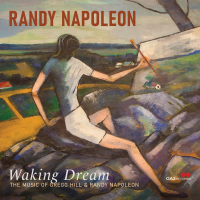Home » Jazz Articles » Wide Open Jazz and Beyond » A Question of Time
A Question of Time

This idea has intrigued me for a while, so when I interviewed

Derek Trucks
guitarRhoda Scott

Rhoda Scott
organ, Hammond B3b.1938
The daughter of a minister, she began playing organ in church and working with gospel choirs, which eventually led to performing with a small jazz band. She studied classical piano, but continued to concentrate on the organ, earning a Masters' degree in music theory from the Manhattan School of Music. Jazz, gospel, and classical music all come together in her approach to music, so she immediately came to mind when planning this piece.
Her pick for jazz is the April 2,1955 benefit concert for Carlie Parker at Carnegie Hall organized by Dizzy Gillespie and friends to pay for Bird's funeral expenses. It began at midnight and went on until 3:40 am when the police shut it down. This caused an uproar because many musicians had not yet played. Nonetheless, those 2760 jazz fans who got into the sold out concert saw:

Dizzy Gillespie
trumpet1917 - 1993

Art Blakey
drums1919 - 1990

Thelonious Monk
piano1917 - 1982

Billie Holiday
vocals1915 - 1959

Sarah Vaughan
vocals1924 - 1990

Dinah Washington
vocals1924 - 1963

Billy Eckstine
vocals1914 - 1993

Sammy Davis Jr.
vocals1925 - 1990

Stan Getz
saxophone, tenor1927 - 1991

Oscar Pettiford
bass1922 - 1960

Lester Young
saxophone1909 - 1959

Horace Silver
piano1928 - 2014
For her blues pick she didn't specify a particular artist, but simply opted for Chicago blues in the 1940's. No doubt she would have been treated to quite a show no matter what club she picked. Back then she might have caught Big Bill Broonzy performing his "Key to the Highway" with a young

Muddy Waters
guitar1915 - 1983
As an organist, her classical pick of Johann Sebastian Bach is not surprising. He was also on my own short list. I would have probably picked the 20 year old Johann who walked off the job and literally continued walking some 250 miles to Lobeck to hang out with Dieterich Buxtehude, the Big Daddy of German organ. Young Johann stayed on for several months, and as the story goes, would have become Buxtehude's amanuensis, except that the position would have also required him to marry the boss's daughter.
Rhoda opted for his years (1723-50) as Cantor of the Thomas School adjacent to the Thomas Church. This too would have been an ideal time as Bach was then the Big Kahuna of the musical scene in Leibzig. By this time he had composed a vast amount of music, and was performing large scale cantatas. She would be able to see him on organ and harpsichord, directing singers and musicians—that would be a thrill indeed.
Rhoda's rock selection is fitting as it comes on the 40th anniversary of the Woodstock Festival. A great pick, not only an event with historic and cultural significance, but she would see a literal who's-who of sixties rock:

Jimi Hendrix
guitar, electric1942 - 1970

Paul Butterfield
harmonica1942 - 1987

Ravi Shankar
sitar1920 - 2012
Pete Fallico
For those of us who love the Hammond B3 sound, Pete Fallico is simply, "The Ultimate Hammond Organ Afficianado." He is also a well-known radio personality, concert promoter, record producer, and friend to scores of the most respected names in organ jazz. His Doodlin' Lounge website and podcast are two of the best spots on the web for B3 fans.
Pete's jazz pick: "A jazz event that I would have loved to have attended would be the opening night for

Jimmy Smith
organ, Hammond B31925 - 2005
Another interesting pick: "For a Blues event I would like to have been at the 1960 Newport Jazz Festival in Rhode Island when Muddy Waters performed. It was recorded and released as his first live album. This was like a resurrection of his career."
His classical pick is especially intriguing: "For a classical music event I would think that any of the NBC Symphony Orchestra's broadcasts conducted by Arturo Toscanini would have been momentous. I would like to have been there for the 1942 broadcast of Dimitri Shostakovich's Symphony No. 7."
Toscanini was of course one of the most respected classical musicians and conductors of the 19th and 20th centuries, and this was the American premiere of this symphony. Because of WWII the score had to be mircofilmed and brought to America via courier from the Soviet Union.
For his rock pick Pete chose the summer of love: "The Monterey International Pop Music Festival held at the Monterey County Fair Grounds between June 16 and June 18, 1967 helped to usher in the so-called 'Summer of Love' era. That would be the event that I wish I had attended. Even though I live just 60 miles away from Monterey, I did not go that weekend and I have regretted it ever since."
This was America's first large scale rock festival and was also the first major appearance in the United States of several of its headliners: Jimi Hendrix, the Who, Janis Joplin, and Otis Redding. When one checks out the list of performers it certainly revivals Woodstock: the Animals, Simon & Garfunkel, Canned Heat, Al Kooper, Paul Butterfield, the Electric Flag with Mike Bloomfield, Steve Miller, Moby Grape, the Byrds, Jefferson Airplane, Booker T and the M.G.'s, Buffalo Springfield, Grateful Dead, the Mamas and Papas and more.
Randall Bramblett

Chuck Leavell
keyboardsb.1952

Steve Winwood
keyboardsb.1948
Randall's classical pick is the premier of Igor Stravinsky's "Rite of Spring" in Paris. The demanding music and extreme dance steps coupled with the provocative opening bassoon solo caused some in the audience to boo and whistle, which escalated to loud arguments. Eventually fist fights broke out and degenerated into a full scale riot. Even the arrival of the police couldn't completely restore order. Stravinsky is reported to have been so upset that he ran out of the theater in tears.
For blues he selected Howlin' Wolf at Weiller's juke joint 1950s. This of course was Howlin' Wolf at his high point with the legendary guitarist Hubert Sumlin at his side. Critic Cub Koda declared, "no one could match him for the singular ability to rock the house down to the foundation while simultaneously scaring its patrons out of its wits." Indeed, at 6'6" and 300 pounds with a voice to match, Howlin' Wolf must have been a force to behold.

John Coltrane
saxophone1926 - 1967
Finally, for his rock moment in time Randall picked the Rolling Stones performing at Georgia Southern College, Statesboro, Georgia on May 4, 1965. Kids paid $2.50 to see The Rolling Stone "from England," sponsored by Sigma Epsilon Chi. Of course Brian Jones was still with the band at this point. I couldn't find a setlist of this concert, but they were promoting their new LP The Rolling Stones Now!(1965)
"Everybody Needs Somebody to Love," "Down Home Girl," "You Can't Catch Me," "Heart of Stone," "What a Shame," "Mona (I Need You Baby)," "Down the Road Apiece," "Off the Hook," "Pain in My Heart," "Oh Baby (We Got a Good Thing Goin')," "Little Red Rooster," and "Surprise, Surprise."
My Picks
For classical music, it would be tempting to go with J.S. Bach, Mozart, or Liszt, but as long as we're going back in time, I'd want to experience something extra. So I would like to be part of the 12,000 people in 1749 who endured a three hour traffic jam of carriages in London to hear an outdoor performance of Music for the Royal Fireworks by Handel.
The formal concert was held in Green Park on April 27, 1749 in a specially constructed stage, with the music included to provide background for a royal firework display. Murphy's law struck and the building caught on fire, but I would have selected the rehearsal performance a week earlier anyway. It was held at Vauxhall Gardens and was open to the public, thus the massive traffic jam.
For jazz, I imagine being a fly on the wall at

Gil Evans
composer / conductor1912 - 1988
It's very difficult for me to come up with a blues pick. In terms of pure enjoyment I would have probably gone with seeing Howlin' Wolf or Elmore James at a club in the fifties. However, given only one chance to go back and experience something, I would pick seeing the greatest Delta bluesman of all time, Robert Johnson. I must admit that his limited and primitive recordings don't really move me, but his songwriting was truly remarkable. For that reason I'd like to experience Robert Johnson as more than a tinny old recording and a couple of photographs.
I imagine seeing

Robert Johnson
vocals1911 - 1938
For rock, the festivals mentioned above are very tempting. However, because they are well preserved on film, I would instead follow Johnny and the Moondogs on the October day in 1959 when they auditioned at The Carroll Levis "TV Star Search" held at the Empire Theatre in Liverpool, England.
The trio was made up of Johnny Lennon who had just turned 19,

Paul McCartney
bass, electricb.1942
So now, how about you?
Photo Credits
Stock Image Pixabay
Pete Fallico
Randall Bramlett
Rolling Stones: Kevin Delaney
A view of the illuminations: Wikipedia
Reference Material
Wikipedia
Tags
Wide Open Jazz and Beyond
Alan Bryson
United States
Derek Trucks
Rhoda Scott
Dizzy Gillespie
Art Blakey
Thelonious Monk
Billie Holiday
Sarah Vaughan
Dinah Washington
Billy Eckstine
Sammy Davis Jr.
Stan Getz
Oscar Pettiford
Lester Young
Horace Silver
Muddy Waters
Jimi Hendrix
Paul Butterfield
Ravi Shankar
Jimmy Smith
Chuck Leavell
Steve Winwood
John Coltrane
Gil Evan
robert johnson
Paul McCartney
Comments
PREVIOUS / NEXT
Support All About Jazz
 All About Jazz has been a pillar of jazz since 1995, championing it as an art form and, more importantly, supporting the musicians who make it. Our enduring commitment has made "AAJ" one of the most culturally important websites of its kind, read by hundreds of thousands of fans, musicians and industry figures every month.
All About Jazz has been a pillar of jazz since 1995, championing it as an art form and, more importantly, supporting the musicians who make it. Our enduring commitment has made "AAJ" one of the most culturally important websites of its kind, read by hundreds of thousands of fans, musicians and industry figures every month.





 Buy Now
Buy Now

















